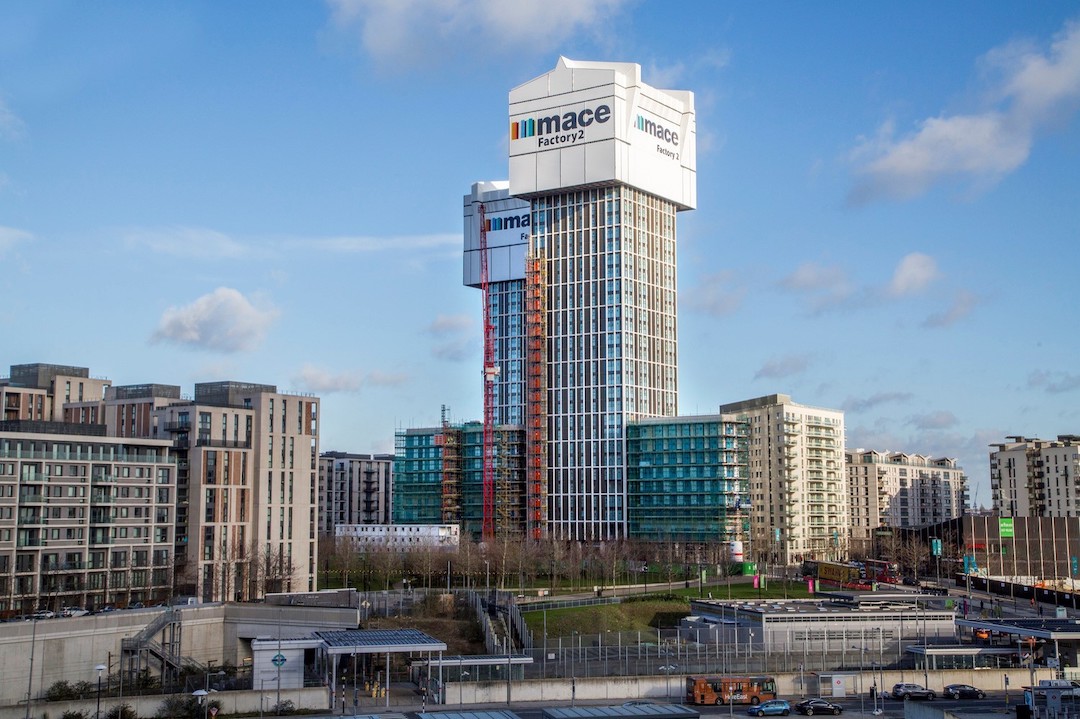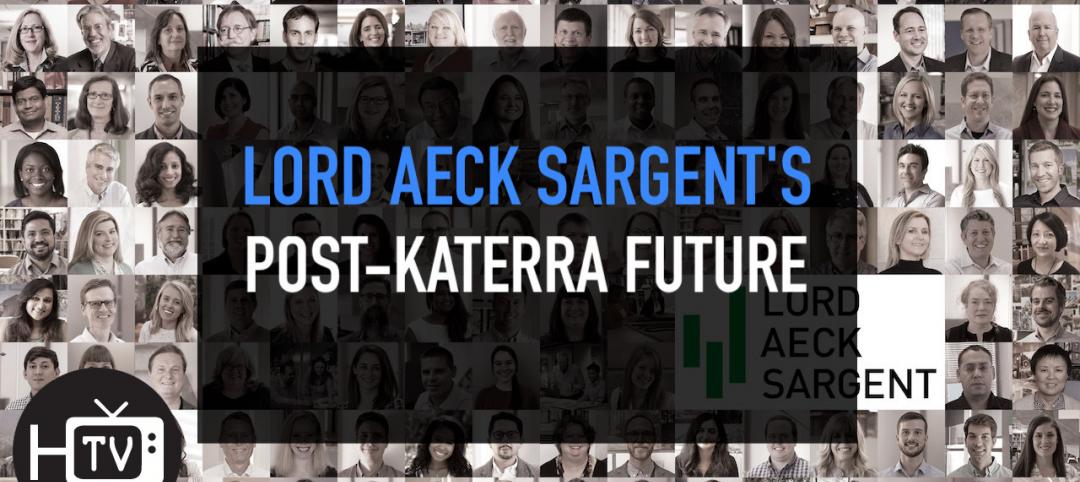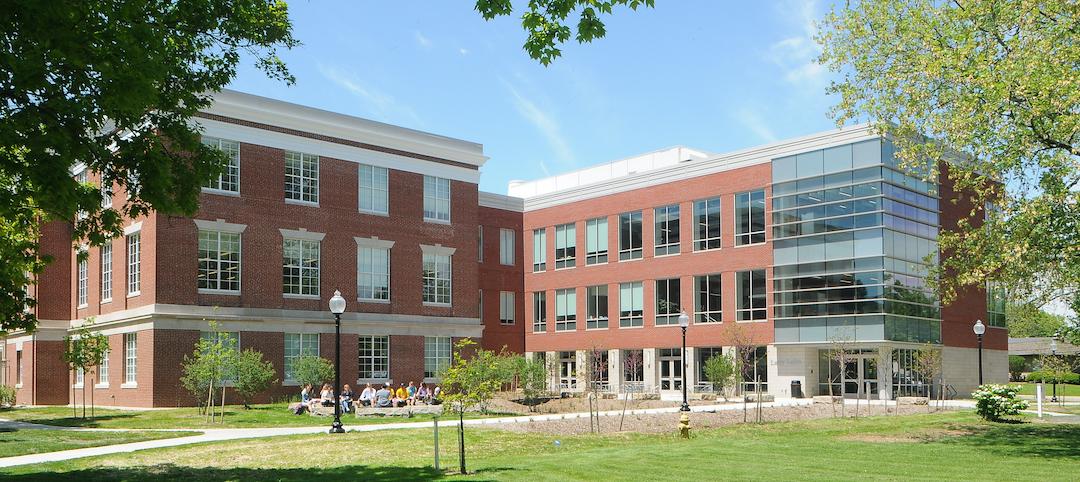Mace Group is London’s largest contractor, and has been associated with some of that city’s signature projects, including its 95-story skyscraper The Shard; the 443-foot-high cantilevered observation wheel known as London Eye; and Heathrow Terminal 5, which at nearly four million sf on 640 acres is the largest freestanding structure in the United Kingdom.
Since its inception in 1990, Mace has explored where production and construction might intersect. That inquest is suddenly urgent today, as U.K. cities will need 10,500 new homes to be built per month every year through 2038. To meet that demand, the country’s construction industry must rev up its productivity by 30%.
Recently, Mace took a step toward shifting from construction to production when it literally built factories on top of two under-construction residential towers in Stratford. Workers within those factories poured concrete, and assembled and installed prefab MEP systems, bathroom pods, risers, and façade components. The firm showcased its factory during a presentation at Autodesk University in London in June.
Skyscrapers rise with six-story prefab factories
The six-story factories each weighed 510 tons and were 35 meters wide, 41 meters long, and 33 meters high. Some of their spaces were dedicated to materials delivery, façade installation, and assembling sub-assemblies. The structural engineer Davies Maguire helped Mace figure out how the building would manage that weight load.
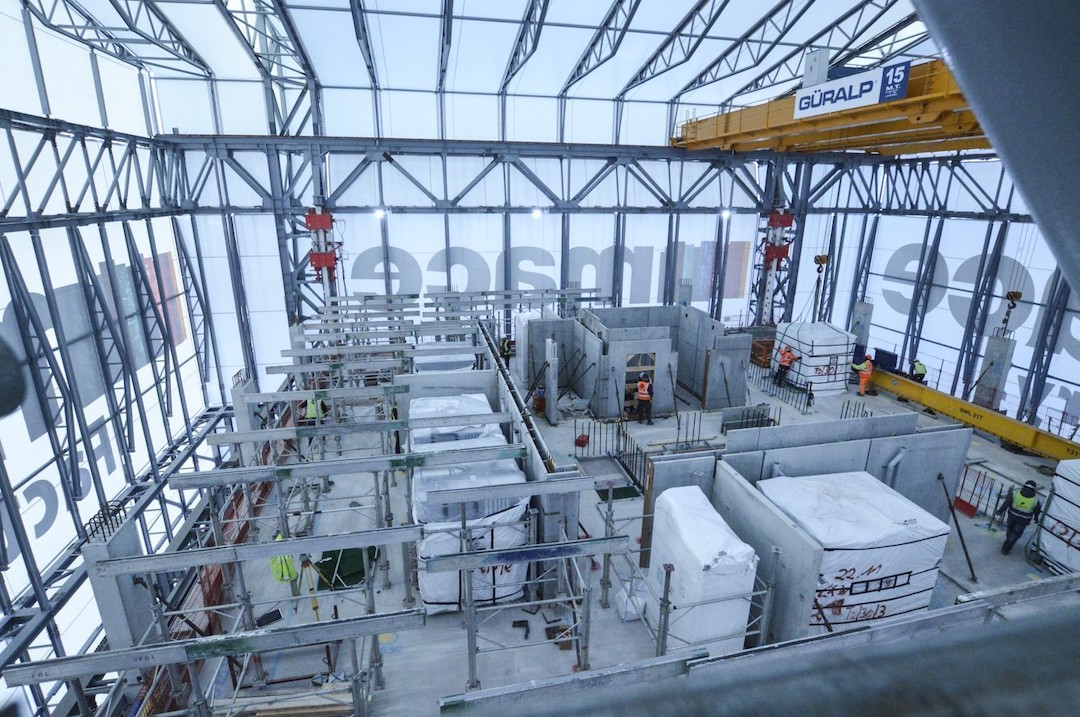 Photo: Mace Group
Photo: Mace Group
Matt Gough, Mace’s Director of Innovation and Work Winning, tells BD+C that the factories were “cost neutral” in that they eliminated the need for tower cranes, and increased productivity to the point where crews could complete 18 floors in 18 weeks. The factories reduced the project’s transportation by 40%, and its waste by 75% compared to a more conventional construction site. This project’s “gross value added” per worker, at £80 ($101.41) per hour worked, was higher than the U.K.’s average for construction and manufacturing.
“We changed the process for delivering high rises,” says Gough, even as it struggled at first to get some trades to work “in a different way.”
In January, Mace handed over the two residential towers to their developer, a joint venture between Qatari Diar and Delancey. Stratford is Mace’s sole project with onsite factories. The contractor is open to doing more projects like it in the U.K. and elsewhere (it has a construction management office in New York). Mace’s goal is to be “manufacturing” 85% of its projects 50% faster by 2022 via just-in-time logistics and sharper site management abetted by technology.
The contractor is doing modular construction on some projects, and intends to rely more on offsite prefabrication, which could result in safer jobsites with fewer workers needed.
How do you construct one floor of a building in just 55 hours? At N08, our project at East Village in Stratford, Mace used the 'rising factories' - an #innovative new #construction method - to deliver a step change in productivity and efficiency. Watch our latest video: pic.twitter.com/evIOsT3GTU
— Mace (@MaceGroup) June 13, 2018
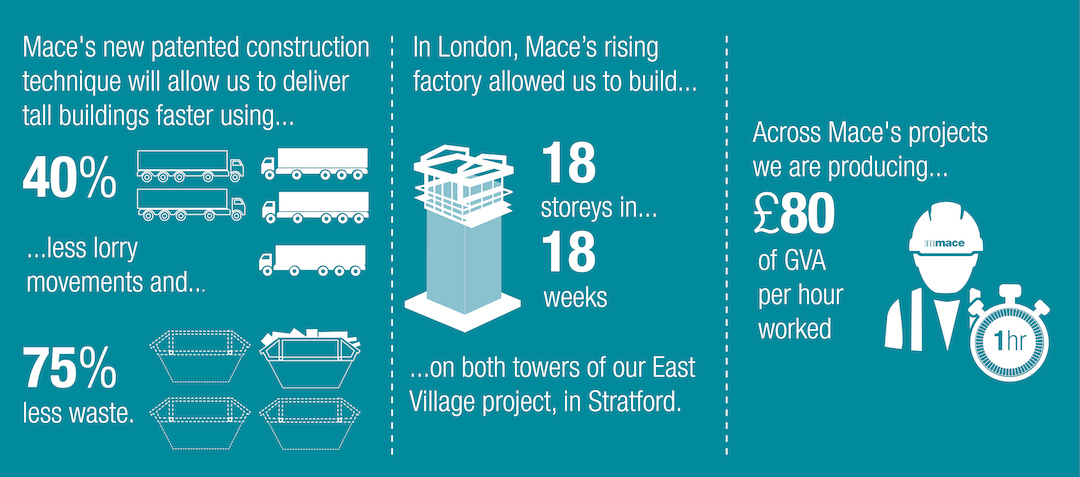 Infographic: Mace Group
Infographic: Mace Group
Related Stories
AEC Business Innovation | Sep 28, 2021
Getting diversity, equity, and inclusion going in AEC firms
As a professional services organization built on attracting the best and brightest talent, VIATechnik relies on finding new ways to do just that. Here are some tips that we’ve learned through our diversity, equity, and inclusion (DE&I) journey.
Architects | Aug 5, 2021
Lord Aeck Sargent's post-Katerra future, with LAS President Joe Greco
After three years under the ownership of Katerra, which closed its North American operations last May, the architecture firm Lord Aeck Sargent is re-establishing itself as an independent company, with an eye toward strengthening its eight practices and regional presence in the U.S.
AEC Tech | Jan 28, 2021
The Weekly show, Jan 28, 2021: Generative design tools for feasibility studies, and landscape design trends in the built environment
This week on The Weekly show, BD+C editors speak with AEC industry leaders from Studio-MLA and TestFit about landscape design trends in the built environment, and how AEC teams and real estate developers can improve real estate feasibility studies with real-time generative design.
AEC Tech | Nov 12, 2020
The Weekly show: Nvidia's Omniverse, AI for construction scheduling, COVID-19 signage
BD+C editors speak with experts from ALICE Technologies, Build Group, Hastings Architecture, Nvidia, and Woods Bagot on the November 12 episode of "The Weekly." The episode is available for viewing on demand.
Smart Buildings | Oct 26, 2020
World’s first smart building assessment and rating program released
The SPIRE Smart Building Program will help building owners and operators make better investment decisions, improve tenant satisfaction, and increase asset value.
Smart Buildings | Oct 1, 2020
Smart buildings stand on good data
The coming disruption of owning and operating a building and how to stay ahead through BIM.
University Buildings | Jun 3, 2020
Renovation can turn older university buildings into high-performing labs
David Miller of BSALifeStructures offers technical advice on renovation of college and university laboratories and scientific research facilities.
Green | Mar 9, 2020
BuroHappold commits to all new building projects achieving net-zero carbon by 2030
The engineering firm also launched a long-term partnership with ILFI.
AEC Innovators | Mar 5, 2020
These 17 women are changing the face of construction
During this Women in Construction Week, we shine a spotlight on 17 female leaders in design, construction, and real estate to spur an important conversation of diversity, inclusion, and empowerment.
AEC Innovators | Aug 27, 2019
7 AEC industry disruptors and their groundbreaking achievements
From building prefab factories in the sky to incubating the next generation of AEC tech startups, our 2019 class of AEC Innovators demonstrates that the industry is poised for a shakeup. Meet BD+C’s 2019 AEC Innovators.


